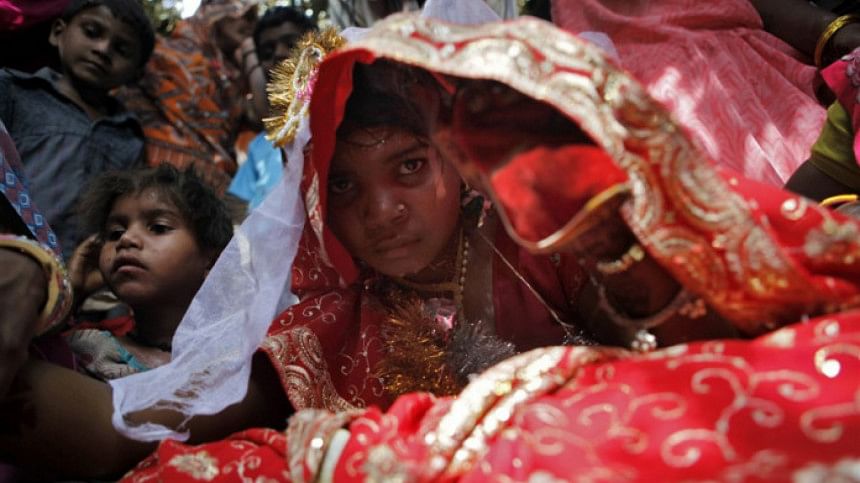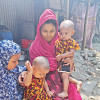Act against discrimination: New strategies to prevent child marriage in Bangladesh

Every year, on October 11, the International Day of the Girl Child is commemorated to renew public commitments to addressing the needs of girls globally. Despite some progress, girls around the world continue to face significant challenges in enjoying their fundamental rights and remain constrained by society, culture and the law in achieving their full potential. Regardless of their religion, ethnicity, caste, location or age, all girls have the right to a safe, educated and healthy life, and in making their own choices and decisions—not just during their formative years but as they become women.
Governments across the globe have launched numerous initiatives to promote the empowerment of girls and to ensure their human rights. In many areas, we have seen visible improvements, such as increased participation of girls in schools and public spaces. In 2015, the Sustainable Development Goals (SDGs) introduced a set of new targets specifically aimed at states taking action to accelerate progress on securing the rights of the girl child. These included eliminating child marriage by 2030. However, inadequate state policies, and lack of action to shift deeply entrenched social norms continue to prevent millions of girls from realising their full potential.
In Bangladesh, there has been significant progress on many social indicators towards gender equality. While in 1990, girls in Bangladesh lagged behind boys in school attendance, the introduction of the Female Secondary School Stipend and Assistance Programme in 1994 reversed the situation.Various initiatives—such as adolescent development clubs, skills training programmes, and financial incentives including cash payments—have been taken up to mitigate the practice of child marriage, and particularly its socioeconomic drivers, i.e., lack of livelihood or economic opportunities, and critically the perception of the absence of safety and security for women outside of marriage.
Despite such efforts and three decades of education-focused interventions, Bangladesh continues to be ranked eighth in the world today in terms of the incidence of child marriage. According to the 2019 Bangladesh Multiple Indicator Cluster Survey, 51 percent of young women were married in childhood. According to a 2022 survey by the Bangladesh Bureau of Statistics (BBS), 40.9 percent of women aged 20-24 were married before turning 18, with rural areas showing even higher rates at 44.4 percent.
This year's theme for International Day of the Girl Child, "Girls' Vision for the Future," emphasises both the urgency of the issue and the hope that lies in girls' voices and aspirations. For Bangladesh, it is another opportunity for introspection: are we doing enough to combat child marriage, one of the biggest obstacles to girls' securing self-determination over their own futures? If so, why do we still see high rates of child marriage, despite significant improvements in women's economic, social and legal empowerment?
In recognition of the multi-dimensional nature of the challenge, existing initiatives have been supplemented by changes in the law. The Child Marriage Restraint Act, 2017 introduced stricter penalties for underage marriages, that is for marriages where brides are aged below 18, and grooms below 21, alongside clear duties for those involved in arranging or solemnising marriages, and the establishment of new mechanisms—child marriage restraint committees—aimed at effective and timely response and prevention, engaging local government bodies and civil society.
It is necessary and useful to lay down this clear red line, as knowledge of the law and invocations of the threat of penalties for its breach can be empowering for young people to negotiate delays or alternatives to marriage with their parents and communities. However, the law is not sufficient in itself particularly as it is unrealistic to expect such a law to be enforced through prosecution and punishment. On the other hand, if knowledge of the law, among both rights holders and duty bearers, can be significantly expanded, it can play a real role, through its expressive power, in empowerment of young people and in preventing child marriages from taking place.
Our own research suggests that simply increasing investment in education is not enough to address the problem. Based on a census of 21,236 households and a survey of 3,997 households conducted in September-October 2023 in urban neighbourhoods across four districts (Dhaka, Dinajpur, Khulna and Patuakhali), we found that 57 percent of young women aged 18-24 years in our study population were already married, and among them, 53.8 percent had married before the age of 18. The average years of schooling was 8.75. However, this was not sufficient to stem the tide of early marriage. This is all the more surprising considering the fact that our study strictly focused on urban municipal areas.
Alarmingly, in Patuakhali—a district severely affected by climate change—a total of 65 percent of the young women respondents were already married, with an average of 9.5 years of schooling. This data highlights the need for innovative approaches to prevent child marriage, looking beyond the traditional calls for investment in girls' formal education.
These findings correspond to the baseline survey of the SafePlus programme, a new youth-led initiative designed to support peers at risk of early marriage that we launched last year. Funded by the Global Innovation Fund and implemented in collaboration with the Bangladesh Legal Aid and Services Trust (BLAST), SafePlus aims to create a network of youth groups capable of tackling child marriage in low-income communities, in urban areas including informal settlements. The programme empowers youth by providing leadership and negotiation training, along with education on their rights and remedies with respect to marriage and related services to enable them to catalyse preventive action. Critically it focuses on building understanding among young people and their guardians, and across the communities in which they live, about their right to consent, to make decisions, and to self-determination, and protection against violence, alongside building skills to access economic opportunities.
The struggle to end child marriage in Bangladesh requires fresh thinking and innovative strategies. While education remains a critical tool, our research indicates that more tailored, community-based interventions such as SafePlus may hold the key to creating sustainable change.
We can mark the International Day of the Girl Child this year by renewing our commitment to advancing the cause of girls' empowerment and right to self-determination. The continuing practice of child marriage is not only a violation of individual rights; it is a barrier to progress for the entire nation. We owe it to the next generation to act decisively and ensure a more equitable future for all girls in Bangladesh, ensuring that young people are at the forefront of these changes, and in charting the course of their own lives and freedoms.
M Niaz Asadullah is professorial fellow in economics at North South University (NSU), Bangladesh, and editorial advisory board member of the journal 'Feminist Economics.'
Sara Hossain is senior advocate at the Supreme Court of Bangladesh, and honorary executive director of Bangladesh Legal Aid and Services Trust (BLAST).
Zaki Wahhaj is professor of development economics at King's College London, UK.
Views expressed in the article are the authors' own.
Follow The Daily Star Opinion on Facebook for the latest opinions, commentaries and analyses by experts and professionals. To contribute your article or letter to The Daily Star Opinion, see our guidelines for submission.

 For all latest news, follow The Daily Star's Google News channel.
For all latest news, follow The Daily Star's Google News channel. 








Comments